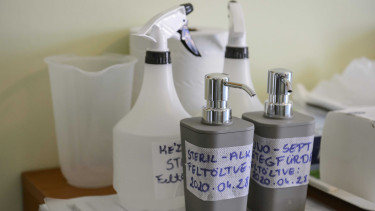Hungary should reveal vaccination status of new COVID-19 patients - virus expert

Vaccines will go bad just like milk
Rusvai warned that COVID-19 vaccines have an expiry data just like milk or beer. When their shelf-life is over, they get safely destroyed. This is nothing new, the flu shots of the previous year also end up in the dumpster (not literally, of course). Their composition changes every year in any case, depending on which strain of the virus is expected to spread.
The virus expert underlined that while new COVID-19 vaccines are being developed against the new coronavirus variants, the existing vaccines can still be used against them. Even if their efficacy is slightly smaller than against the previous variants, they are still an excellent protection, he said.
The worst is if the vaccines bought go bad on the shelves. They should be delivered where they are needed and can be administered, said Rusvai.
According to data by the European Centre for Disease Control (ECDC), Hungary has contracted for nearly 30.5 million doses of COVID-19 vaccines, of which 23.42 million would be procured via the European Union and over 7 million doses have already been purchased from the East (5.2 million doses of Russia’s Sputnik V and over 2 million doses of China’s Sinopharm).
Although Hungary has nearly 20.5 million doses of COVID-19 vaccines in storage, only 12 million doses have been administered so far (5.86 mn 1st, 5.58 mn 2nd and 626,000 3rd doses).
Rusvai also pointed out that they have practically hit the vaccination ceiling in the EU and in the developed world, adding that Hungarians’ willingness to get their jabs cannot be boosted significantly, either. The vaccines remaining in storage will be destroyed if they are not used within a given period, he stressed.
Whereas the efficacy of certain vaccines, e.g. of Comirnaty developed by Pfizer-BioNTech, wanes with time, Rusvai highlighted that in the vile efficacy remains intact, i.e. they are just as efficient when administered just before expiry as when they rolled out of the factory.

Motivation needed
Unvaccinated people need to be motivated to get their shots. Rusvai said the most powerful catalyst would be if they brought to light how many of the COVID-19 patients on ventilator and of the deceased were not vaccinated and how many were, and what vaccines they had received.
Let's not forget that statistics in every country have shown so far that a lot fewer vaccinated people than unvaccinated end up in serious condition when infected with coronavirus
, said Rusvai.

As regards the fourth wave, he said a continuous growth can be expected. You can wager that there will be a steady and trend worsening of epidemiological data in Hungary.
In his view, four indicators need to be monitored closely: the number of new cases, hospitalised patients, patients needed mechanical ventilation, and Covid fatalities.
In view of these statistics, we can already be sure that there will be a steady growth in September and October, and the spread of the virus will likely gather pace in October. The spread is still slow but we are in a stage of permanent growth.
Mask up!
Rusvai thinks that wearing face masks is warranted already in the current stage. He said he also ‘masks up’ in stores, public institutions and public transport.
Mask-wearing regulations are a lot tighter in all of the neighbouring countries than here
, he reminded.
The virus expert stressed that wearing a mask is practical also due to the spread of other respiratory virus infections. There have been various reports recently that schools, kindergartens and work places are already in the autumn virus period. The infections are not necessarily caused by coronavirus, and in most cases coughs, sneezes, and a runny nose yield negative Covid tests. But wearing a mask is a good protection also against other viruses and bacteria alike, said Rusvai.
Toxicologist Gábor Zacher, head physician at the Hatvan hospital, told commercial broadcaster RTL on Tuesday that 95% of Covid patients admitted in hospitals are unvaccinated. He also wears masks in public and urged mask-wearing to be made mandatory indoors. He also urged people to maintain the previous precautionary measures, such as social distancing, increased hygiene, hand washing or sanitizing, and a regular disinfection of our phones.
Cover photo: MTI/ János Mészáros





